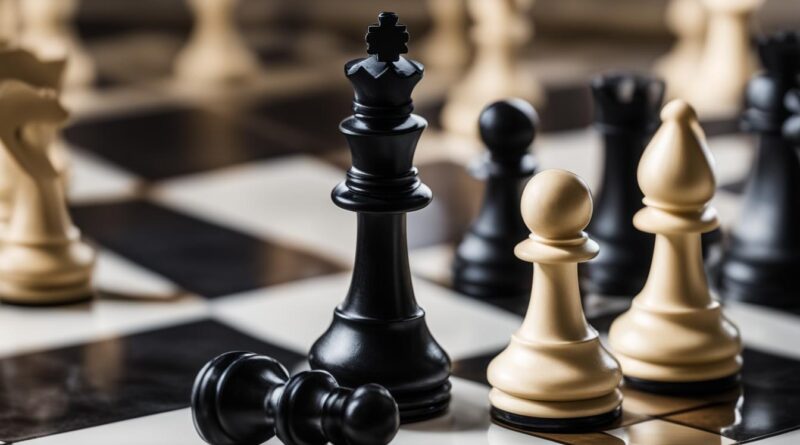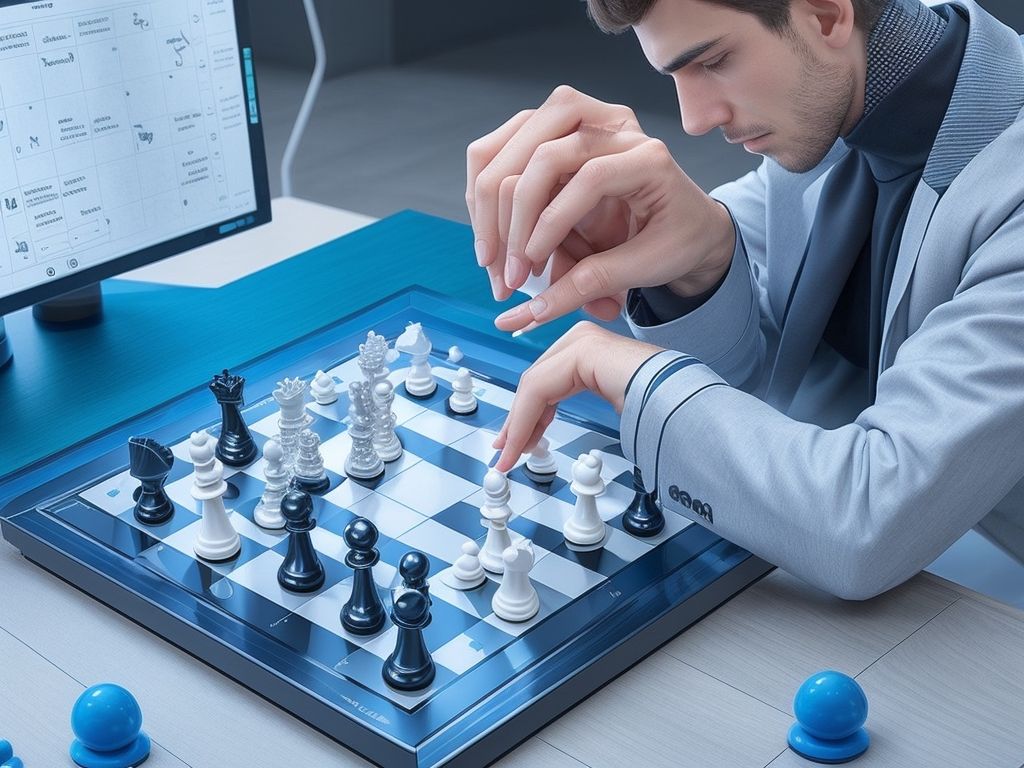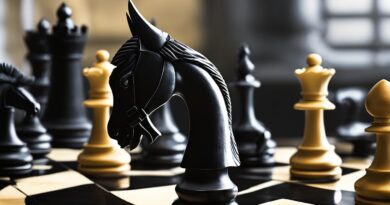Opposition in Chess: Understanding the Concept and Strategies to Gain Advantage
Chess is a game of strategy and foresight. Every move counts, and understanding the concept of opposition can give you a significant advantage over your opponent. Opposition in chess refers to a situation where both kings face each other with only one square between them. This creates a mutual barrier that prevents your opponent from getting closer and allows you to gain important squares.
In this article, we will delve into the definition of opposition, explore different types of opposition, and highlight the importance of incorporating opposition strategies into your game. Whether you’re a beginner or an experienced chess player, mastering opposition can elevate your game to new heights.
Key Takeaways:
- Opposition in chess refers to a situation where both kings face each other with only one square between them.
- Understanding and utilizing opposition strategically can help you gain an advantage in the game.
- Direct opposition occurs when the square between the kings is on a rank or file, while distant opposition involves more than one odd-numbered square between them.
- Opposition is crucial in endgames, allowing you to control key squares and promote pawns.
- Test your knowledge and practice using opposition with puzzles to enhance your skills.
What is Opposition in Chess?
Opposition in chess is a fundamental technique that involves positioning both kings facing each other with only one square between them on a rank, file, or diagonal. This configuration creates a barrier that prevents the opponent from advancing and gives the player with the opposition a strategic advantage.
The concept of opposition is especially crucial in king and pawn endgames, where a well-executed opposition can determine the outcome of the game. By obtaining the opposition, a player can control important squares, restrict the opponent’s king, and create opportunities to promote their pawns.
“Opposition is a key technique in chess that allows you to control the position of the game and restrict the opponent’s options. By mastering the concept of opposition, you can enhance your strategic thinking and increase your chances of success.”
Why is Opposition Important?
Understanding and utilizing opposition effectively can significantly improve your chess game. By gaining the opposition, you gain control over key squares while limiting your opponent’s king’s movements. This can lead to favorable position transitions and create tactical opportunities to secure a winning advantage.
Opposition is particularly important in endgames, where every move counts. Using opposition strategically can be the difference between a draw, a win, or a loss. It allows you to maneuver your king into optimal positions, block your opponent’s progress, and seize the initiative.
Direct and Distant Opposition
In the game of chess, opposition comes in two main forms: direct and distant opposition. Direct opposition occurs when there is only one square between the kings on a rank or file. This type of opposition is often easier to spot and can be strategically used to control key squares and restrict the opponent’s movements.
Distant opposition, on the other hand, occurs when there are odd number of squares between the kings, with that number being greater than one. This type of opposition requires a more careful analysis as it may involve longer maneuvers to maintain the advantage. Distant opposition is particularly useful in situations where the kings are far apart and there is a need to gain control over specific areas of the board.
Both direct and distant opposition are important concepts to understand in chess as they offer different strategic possibilities. By recognizing and utilizing these forms of opposition, players can gain a significant edge over their opponents and increase their chances of success in the game.
Strategies for Using Direct and Distant Opposition
Direct opposition is often used to gain control over central squares or to prevent the opponent’s king from advancing. By placing your king directly in front of the opponent’s, you restrict their movement and limit their options. This can be especially effective in endgame scenarios where every move counts.
Distant opposition, on the other hand, requires more careful planning and maneuvering. By creating a greater gap between the kings, you can force your opponent into making specific moves that ultimately work to your advantage. This type of opposition is often seen in more complex endgames where precision is key.
Mastering both direct and distant opposition can greatly enhance your chess skills and give you a deeper understanding of the game. By practicing and analyzing different scenarios, you can develop a strategic mindset that allows you to capitalize on opposition and gain the upper hand on the chessboard.
Importance of Opposition in Chess
The concept of opposition in chess is not only important but also fundamental to gaining an advantage in the game. By understanding how to use opposition, players can strategically position their king to control key squares and promote their pawns, ultimately leading to victory.
Opposition allows players to create a barrier that prevents the opponent’s king from advancing. This can be crucial in endgame scenarios, where every move counts. By utilizing direct or distant opposition, players can restrict their opponent’s king while gaining access to important squares for their own king.
Harnessing the power of opposition can mean the difference between winning, drawing, or losing a game. It requires careful calculation and strategic thinking to exploit the concept to its fullest potential. Being able to recognize when and how to employ opposition can give players a significant advantage over their opponents, especially in endgame situations where resources are limited.
Mastering Chess Strategies
Opposition is just one of many chess strategies that players must learn to become formidable opponents. It is essential to study and practice various strategies to improve overall gameplay. By continually learning and refining one’s understanding of chess strategies, players can enhance their tactical and strategic abilities, ultimately becoming more successful in their games.
As chess is a game of intellect and strategy, honing one’s skills is an ongoing process. By practicing using opposition and exploring other chess strategies, players can become more confident and competent on the board. Whether playing casually or competitively, understanding the importance of opposition in chess is a crucial step towards becoming a stronger player.
Practicing Opposition: Test Your Knowledge
Now that you understand the concept of opposition in chess, it’s time to put your knowledge to the test. By solving opposition puzzles, you can sharpen your skills and improve your ability to use opposition strategically in your games.
Opposition puzzles are designed to challenge your thinking and help you develop a deeper understanding of how to gain an advantage using opposition. Start with easier puzzles that focus on direct opposition, where the kings are facing each other on the same rank or file. As you progress, move on to more difficult puzzles that involve distant opposition, where the kings are separated by an odd number of squares.
Remember to take your time and analyze the position carefully. Look for opportunities to create an opposition by positioning your king in a way that restricts your opponent’s movement. Don’t be afraid to experiment and try different tactics. With practice, you’ll develop an intuition for recognizing and exploiting opposition in your games.
“Opposition puzzles are not only a way to improve your chess skills but also a fun way to challenge yourself and test your strategic thinking.”
Don’t worry if you get stuck on a puzzle. Use the “hint” button to get a nudge in the right direction. This can help you understand the thought process behind finding the correct move. As you solve more puzzles and gain experience, you’ll start to see patterns and common themes that will make it easier for you to find the winning moves.
So, what are you waiting for? Take up the challenge and start practicing opposition puzzles today. It’s a great way to enhance your chess skills and become a formidable player. Remember, the more you practice, the better you’ll become, so keep pushing yourself and enjoy the journey of mastering opposition in chess.
Conclusion
Understanding and mastering the concept of opposition in chess is crucial for any serious chess player. By using opposition strategically, players can gain an advantage in endgames and improve their chances of winning. Opposition creates a barrier that prevents the opponent from advancing and allows the player with the opposition to control important squares. It is a technique that can be the difference between winning, drawing, and even losing a game.
Opposition can be practiced and honed through puzzles that challenge players to use this technique to win the game. Starting with easier puzzles and gradually moving on to more difficult ones can help players develop their skills in using opposition effectively. Remember to continue learning and studying different chess strategies to become a formidable player.
In conclusion, opposition in chess is a fundamental concept that every chess player should understand and apply. It is a powerful tool that allows players to gain advantage in endgames, control key squares, and promote their pawns. By incorporating opposition into your strategy and practicing it regularly, you can elevate your chess game and increase your chances of success.


